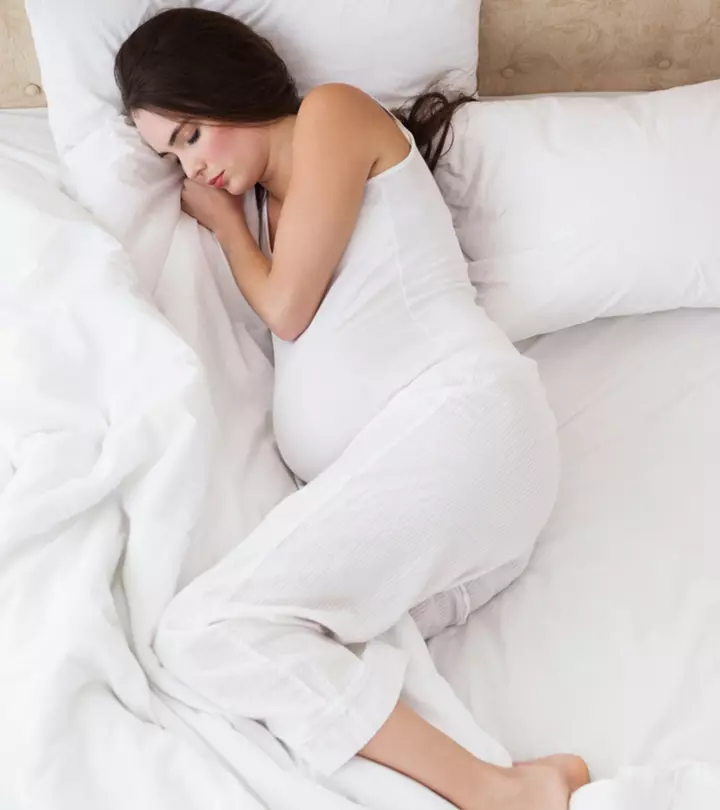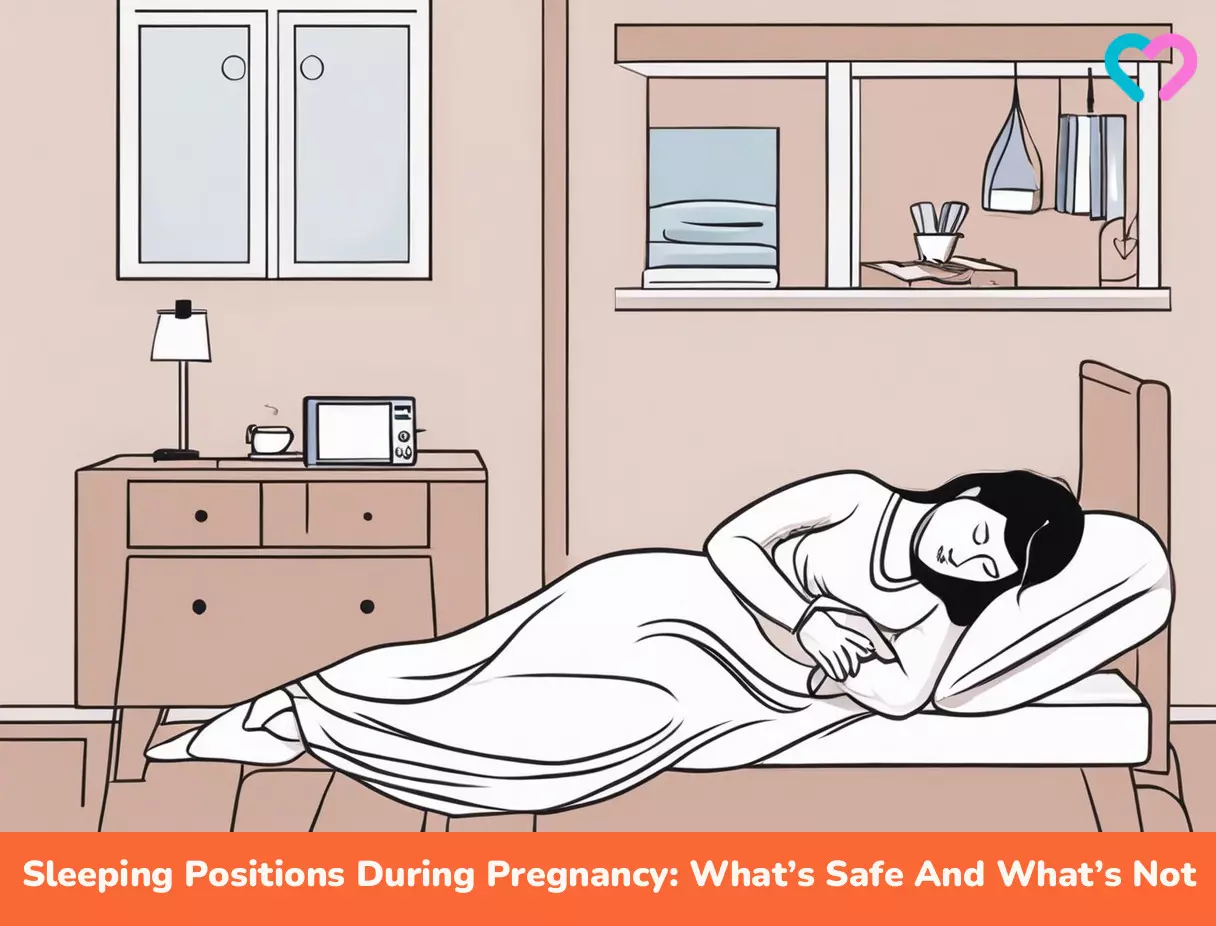
Image: Shutterstock
Pregnancy challenges sleep in many ways, leaving you often exhausted. However, exploring the various sleep positions when pregnant may help you find the most comfortable one, ensuring you get adequate rest. Sufficient sleep is essential during pregnancy for the mother’s well-being and the baby’s development. Sleep disturbances are common due to physical discomfort, hormonal shifts, and anxiety, making it important to find safe and comfortable sleeping positions for better rest. Many women may be able to sleep in their usual sleeping positions early in pregnancy. But you need to adopt new positions to sleep as the pregnancy progresses and your belly bump becomes more pronounced.
In this post, we acquaint you with the most suitable pregnancy sleeping positions and a few tips to get sound sleep.
Key Pointers
- Many pregnant women struggle to find a comfortable sleeping position, especially as the pregnancy progresses.
- Sleeping on the back and stomach may be okay in the first trimester. These sleeping positions may lead to health problems in later trimesters.
- You must start sleeping on your sides from the second trimester since it is the safest sleeping position in pregnancy.
- Using multiple pillows can help make the side-sleeping position comfortable during pregnancy.
What Are The Most Suitable Positions To Sleep During Pregnancy?
There are three common sleeping positions, sleeping on the side, sleeping on the back, and sleeping on the stomach. Read on to know how suitable they are during each trimester of pregnancy (1).
1. First trimester

The first trimester offers you the convenience of sleeping in all three positions since the uterus is not large enough to cause discomfort or uneven weight distribution when sleeping in any position. However, you may use the first trimester as a phase to condition yourself to nap on the side, preferably the left side, since you will have to switch to a side-sleeping position in later trimesters. Practicing from early on in pregnancy can make you habituated to sleep comfortably later (2).
2. Second trimester
Below are some notable points about various sleeping positions and the second trimester (3).
- Sleeping on the stomach: You may sleep on your stomach during pregnancy up to 16 weeks, but it’s best to avoid this position from the second trimester onward. Sleeping on the stomach may be uncomfortable as the belly grows since this sleeping position can compress the uterus and blood vessels.
- Sleeping on the back: The risks associated with sleeping on back during pregnancy become significant from mid-pregnancy onwards. You must stop this sleeping position at this stage since the uterus is large enough to potentially block the inferior vena cava, a vein that carries deoxygenated bloodiOxygen-deficient blood transported through blood vessels called veins to the heart from the lower body to the heart when lying on your back. Compression of these blood vessels could interfere with the blood flow to the placentaiA temporary organ that develops during pregnancy and provides the developing fetus with oxygen and nutrients and the baby. It could eventually cause you to feel dizziness, nausea, shortness of breath, and difficulty breathing.
 Caution
Caution- Sleeping on the side: It is the best position to sleep during pregnancy, and if you are already used to it, then you should continue with it. If you are not yet sleeping on your sides, you must begin to do so by the 20th week when your uterus expands enough to compress major blood vessels if you sleep in other positions.
An anonymous mother says, “Around week 22 of my pregnancy it was becoming more challenging to find a comfortable position. Especially since I was a stomach sleeper. I had to go through the frustration of teaching myself how to sleep on my side. Yesterday I had a pregnant friend of mine ask me about the safest and comfortable positions to sleep in. I told her what worked for me and what my doctor told me would be safe for my baby as I slept. I told her sleeping on my right side was more comfortable to me but my doctor told me that my left side would be safer for my growing belly. I also told her that I slept with a pillow between my legs and under my stomach to keep my back in alignment as best I could and to evenly distribute the weight. That worked the best for me (i).”
3. Third trimester

You must sleep only on your sides, and preferably the left side, from the third trimester (4). Sleeping on the left side can ensure the placenta and other organs in the torso, such as the kidneys, receive adequate blood supply and you therefore experience better sleep quality. A questionnaire-based study was conducted by the US Institute of Health, this study involved more than 8,700 pregnant women who responded about their sleeping habits between the 6 and 13 weeks and then again between the 22 and 29 weeks of pregnancy. The study concludes that sleeping posture during early and mid-pregnancy has no adverse effect on pregnancy. Therefore, expecting mothers can sleep on the right side without any harmful implications to their or their baby’s health (5). Nevertheless, you may give preference to sleeping on the left side since it has been widely noted to cause no complications (6).
 Research finds
Research findsWhat If You Accidentally Sleep On Your Back?

Do not worry if you find yourself waking up on your back in the morning even if you went to sleep while on your sides (7). Lying on the back occasionally and for a few moments does not cause adverse effects. If you wake up in the middle of the night and notice that you are on your back, you may change your position.
You may wake up with breathlessness, dizziness, and nausea if you accidentally rolled over on your back and stayed there for long enough to compress the blood vessels. Therefore, if you do not wake up and continue to sleep on your back, your body will warn you with signs of blood vessel compression before it causes any adverse effects to you or your baby.
Despite the potential adverse effects of sleeping on the back, research indicates that it does not increase the risk of complications, such as stillbirthiFetal demise occurring at or after 20 weeks of pregnancy , high maternal blood pressure, and reduced size of the baby at birth (8). However, more research is needed to understand the implications of sleeping on the back in different trimesters of pregnancy (9). Therefore, until then, give preference to sleeping on your sides, yet do not panic if you find yourself on your back once in a while.
How To Sleep Comfortably During Pregnancy?
Below are a few tips to help you sleep in a comfortable position during pregnancy.
- Use pillows: Place pillows between your legs and one near your belly to support it. Place a large pillow or multiple pillows along your back to provide support and prevent you from rolling on your back entirely. Experiment with numerous pillows of various sizes to find what works the best. You may also consider the large wedge-shaped pillows or a body pillow specially made to support side sleeping during pregnancy.

- Take your partner’s help: You may ask your partner to check on you at a designated time at night in case you tend to roll to your back. If they find you on your back, they may nudge you back to side the position.
- Try reclined position: You place a large pillow and sleep in a reclined side sleeping position or semi-upright position. This position may seem more comfortable to some women and also make it less likely to roll over to your back.
- Have light meals: Pregnancy may cause gastrointestinaliA body system that includes organs involved in ingestion, digestion, and absorption of food and excretion of the waste discomforts, such as heartburn, especially in the third trimester. This may cause you to toss and turn often at night. You may alleviate it by consuming light meals before bedtime. Eat slowly with small bites. Take a short, slow walk at home after a meal and then go to bed.
- Try relaxation techniques: Try ways to relax and sleep well. You may explore ways that work the best to relax you. For instance, meditation and gentle exercises, such as walking, may help you relax and sleep better during pregnancy.
- Stick to a regular sleep routine: Set a consistent bedtime to help your body recognize when it’s time to relax. A steady routine can improve the quality of your sleep and make it easier to fall asleep and wake up.
 Point to consider
Point to consider
Frequently Asked Questions
1. What type of pregnancy pillow is best for sleeping?
Choosing the correct type of pregnancy pillow may depend on factors such as the size of your bed, others sleeping with you, your preferred area of support (between the knees or full body), how much you turn during sleeping, and whether you need to carry it during travel. However, firm pillows may offer more support than soft ones.
2. How can I prevent hip pain while sleeping during pregnancy?
Sleep on your side, keeping your legs and knees bent. If you have hip pain, you may use pillows to support your abdomen and upper leg. Place a pillow or comforter at the small of your back and lean against it if side-lying worsens your pain (reduces pressure on the hip while you sleep) (11).
3. Is it safe to sleep in a recliner during pregnancy?
Sleeping in a recliner is generally considered safe if you find it comfortable during pregnancy.
4. How can I prevent snoring during pregnancy?
Sleeping on your side, elevating your upper body, using nasal strips, saline washes, nasal dilators, maintaining a healthy weight, and following good sleep hygiene may help prevent or reduce snoring during pregnancy (12). In extreme cases, snoring may also be caused due to sleep apnea and must be shown to a healthcare professional.
5. Is using a heating pad while sleeping during pregnancy safe?
Pregnant women shouldn’t use a heating pad while sleeping during pregnancy. Temperature changes may not be properly gauged when sleeping, and high temperatures may adversely affect the fetus (13).
A change in sleep position may often come across as uncomfortable initially, but you will grow used to it. Adopting the side sleeping position from the first trimester is the best way to make yourself comfortable with it by the time you reach the subsequent trimester. Pillows and sleeping in a reclined position can help you stay comfortable while sleeping on your sides in pregnancy.
Infographic: Effective Sleeping Practices for Pregnant Women
Getting adequate sleep during pregnancy is essential, but the physical changes in the body and the growing belly could make it challenging. So, it is always helpful to know ways to tackle the situation. The following infographic provides useful tips and methods to help pregnant women get a good rest and sleep. Check out!

Illustration: Momjunction Design Team
Illustration: Sleeping Positions During Pregnancy: What’s Safe And What’s Not

Image: Stable Diffusion/MomJunction Design Team
Pregnant and not sure what sleeping position is best? Check out this video for tips on how to sleep comfortably during pregnancy.
Personal Experience: Source
MomJunction articles include first-hand experiences to provide you with better insights through real-life narratives. Here are the sources of personal accounts referenced in this article.
i. How to: find the best sleep position while pregnanthttps://booboosbottlesandbabies.blogspot.com/2015/02/how-to-find-best-sleep-position-while.html
References
- Best Sleeping Positions During Pregnancy
https://americanpregnancy.org/healthy-pregnancy/pregnancy-health-wellness/sleeping-positions-while-pregnant/ - Sleeping While Pregnant: First Trimester.
https://www.sleepfoundation.org/pregnancy/sleeping-during-1st-trimester - Michael Cackovic; (2018); Should pregnant women avoid sleeping on their backs?
https://health.osu.edu/health/womens-health/should-pregnant-women-avoid-sleeping-on-their-backs - Sleeping Positions During Pregnancy.
https://www.urmc.rochester.edu/encyclopedia/content.aspx?contenttypeid=85&contentid=p01238 - Robin S. Cronin, et al.; (2019); An Individual Participant Data Meta-analysis of Maternal Going-to-Sleep Position, Interactions with Fetal Vulnerability, and the Risk of Late Stillbirth.
https://www.ncbi.nlm.nih.gov/pmc/articles/PMC6543252/ - Exactly How Bad Is It to Sleep on Your Back When You’re Pregnant?
https://health.clevelandclinic.org/exactly-how-bad-is-it-to-sleep-on-your-back-when-youre-pregnant - I’m Pregnant But Sleeping On My Side Hurts.
https://healthcare.utah.edu/the-scope/shows.php?shows=0_gf5ga51h - Science Update: Sleeping position during early and mid pregnancy does not affect risk of complications, NIH-funded study suggests.
https://www.nichd.nih.gov/newsroom/news/092019-pregnancy-sleep-position - No Sleeping On Your Back Does Not Necessarily Increase Stillbirth.
https://healthcare.utah.edu/the-scope/shows.php?shows=0_29x80d44 - Pregnancy Sleep Positions.
https://www.sleepfoundation.org/pregnancy/pregnancy-sleep-positions - Hip Pain During Pregnancy.
https://americanpregnancy.org/healthy-pregnancy/pregnancy-complications/hip-pain-during-pregnancy/ - Why Do Pregnant Women Snore?
https://www.sleepfoundation.org/pregnancy/why-do-pregnant-women-snore - Taking the Heat: Potential Fetal Health Effects of Hot Temperatures.
https://ehp.niehs.nih.gov/doi/full/10.1289/EHP6221
Community Experiences
Join the conversation and become a part of our nurturing community! Share your stories, experiences, and insights to connect with fellow parents.
Read full bio of Dr. Ben Abbes Taarji Hicham
Read full bio of Sindusha MS
Read full bio of Rebecca Malachi
Read full bio of Reshmi Das























